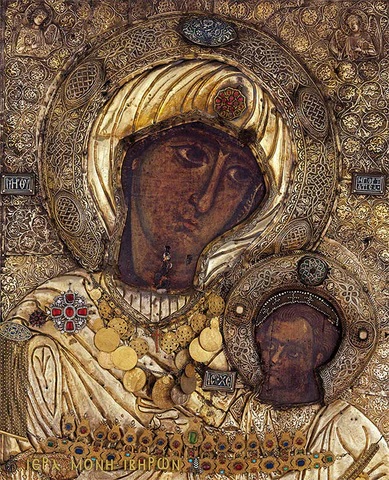- Home
- About us
- Students
- Courses
- Research
- Library
- News & Events
- Gallery
- Contact
- Our Blog
Latest News

Salutations Services During Holy & Great Lent

by Assoc. Professor Philip Kariatlis (Sub-Dean)
During the Lenten season leading to Holy Week and the feast of the Resurrection, the Church in all her wisdom, has included a Friday evening Service known as the ‘Salutations’—in Greek Χαιρετισμοί—a reference to the Akathist Hymn sung to the Theotokos. On the first four Fridays, the faithful will sing only a portion of the Akathist hymn, whilst on the fifth Friday of Great Lent the entire Service is chanted. This hymn consists of 24 stanzas arranged alphabetically celebrating the role of the Theotokos in God’s salvific plan for the world. A refrain, “Rejoice o unwedded Bride” is repeatedly chanted, highlighting her distinct role in God’s saving plan. This gives us a clue as to the meaning behind this special service.
If the entire economy of salvation is centred around the person and work of Jesus Christ, then it is the Virgin Mother that makes this possible through her free consent to give birth to the Son of God. As St Paul tells us in his letter to the Galatians, “when the fullness of time had come, God sent his Son, born of a woman, born under the law… [ὅτε δὲ ἦλθεν τὸ πλήρωμα τοῦχρόνου, ἐξαπέστειλεν ὁθεὸς τὸν υἱὸν αὐτοῦ, γενόμενον ἐκ γυναικός, γενόμενον ὑπὸ νόμον]”(Gal 4:4).
It is for this reason that every Sunday towards the end of the Orthros Service we sing: “You are supremely blessed, O Virgin Theotokos. For through Him who from you became incarnate, Hades has been captured, and Adam has been called back; the curse has been killed, and Eve has been freed; death has been put to death, and we have been brought back to life….”
Indeed, the fathers of the Church point out that the entire purpose of creation was for the all-holy Virgin Mother to be born; namely for a pure, saintly and humble person to consent to God’s pre-eternal plan of salvation. It is through her that the eternal Son of God enters human history, and it is for this reason that the Church rightly offers these salutary services during the Lenten season.
Reflecting on the all-important role of the Virgin Mother in the economy of salvation, we see that prior to Mary’s consent, the human predicament, under the ‘curse of the law’ (cf. Gal 3:13), was in a state of captivity, confined, and unable to experience the deep existential freedom for which the human person was created. Respecting the freedom of the human person, God had to wait patiently for a person to enter history who would freely say “let it be to me according to your word”(Lk 1:38).
Had God not patiently waited for “the fullness of time”—that is, without respecting humanity’s freedom—this would have resulted in God dishonouring, debasing and even humiliating the sacredness of the human person. That is, in forcibly saving humanity, without its consent, God would have destroyed humanity.
In attending the Salutation services every Friday during Great Lent, we behold before our very eyes, the entire unfolding of our salvation through the incarnation of our Lord and Saviour Jesus Christ; we come to the astonishing realisation of the significant role that the Mother of God played in God’s divine economy; and in so doing, we join in, with hearts and voices united, singing to our Mother the Theotokos, “Rejoice, for you have disclosed Christ the Lord who is the lover of humankind… Rejoice the gladness of generations!”
The active participation of the Mother of God in the incarnation is particularly stressed by St Nicholas Cabasilas, a great fourteenth century theologian. He wrote:
“The Incarnation of the Word was not only the work of the Father, Son and Spirit—the first consenting, the second descending, the third overshadowing—but it was also the work of the will and the faith of the Virgin. Without the three divine Persons, this design could not have been set in motion; but likewise the plan could not have been carried into effect without the consent and faith of the all-pure Virgin. Only after teaching and persuading her does God make her His Mother and receive from her the flesh she consciously wills to offer to Him. Just as He was conceived by His own free choice, so in the same way, she became His Mother voluntarily and with her free consent”. (Homily on the Annunciation, 4-5).
It is for this reason, that Panagia holds a special place in the life of the Church. She is the unique treasure of all Christians; the refuge of all the faithful, the protector of Christians and mediator most sure with our Creator; she is for all of us “the bridge leading us from earth to heaven.”
In her presence, we feel a sense of warmth and joy, a sense of trust and protection, because we know that she is truly our Mother too; she is a paradigm of human perfection. For this reason, the hope is that her faith and dedication to doing God’s will inspire us to do the same.
Through life’s difficulties and challenges, may we find hope in knowing that she is with us as “the ever vigilant in intercession and the unshakeable hope for protection.” Knowing that she has become for us “the port and Fair Haven we desire”, may we join in with the proclamation of the Archangel Gabriel saying “rejoice, favoured one Maria; the Lord is with you; blessed are you among women, and blessed is the fruit of your womb.”
May we rejoice in her; may She be the gladness of all generations and of our hearts personally.



.png)